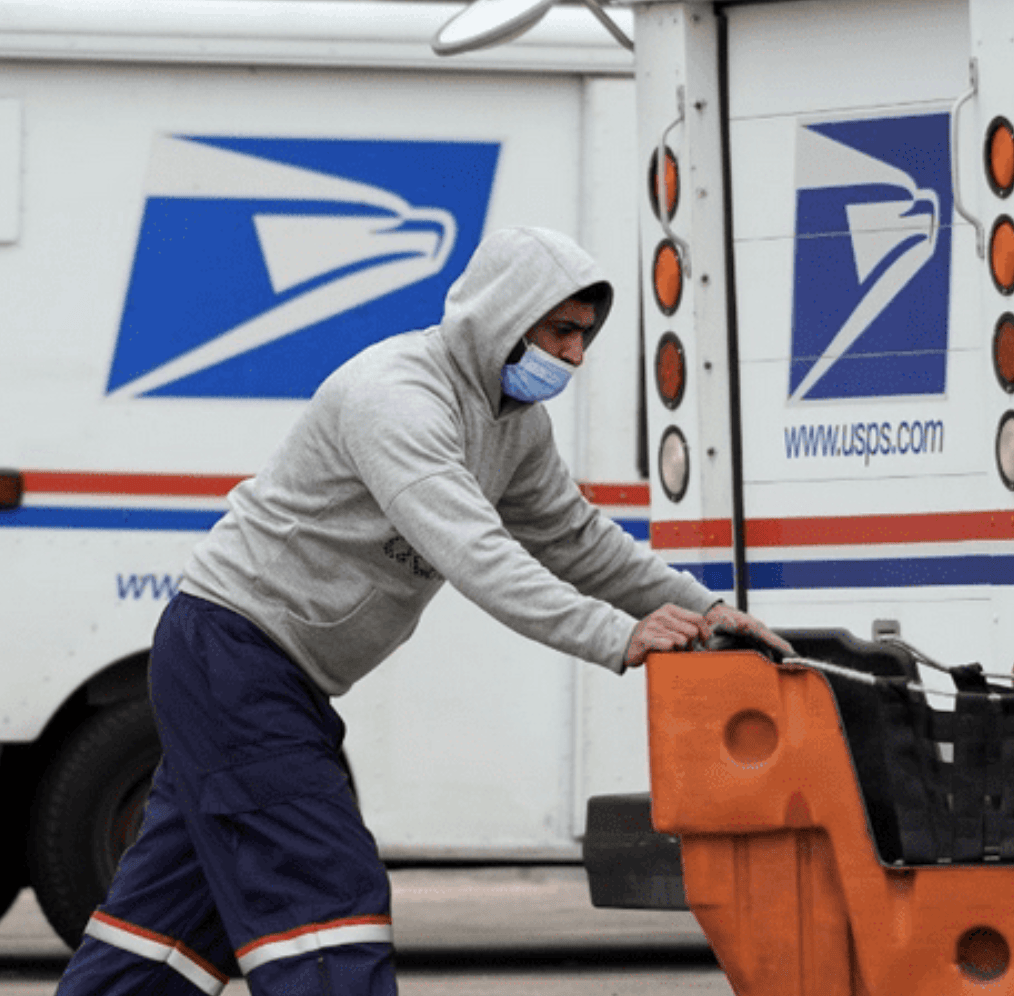These findings are indicative of a lack of understanding and training with respect to Election and Political Mail policy and procedures.
A new audit released last month from the U.S. Postal Service’s Office of the Inspector General confirmed that many USPS facilities are failing to follow proper Election Mail procedures. These USPS service problems threaten the security of votes cast by mail in the upcoming election.
The independent USPS Office of the Inspector General (OIG) conducts “audits, evaluations, research, and investigations” to fulfill its “mission of ensuring efficiency, accountability, and integrity in the U.S. Postal Service.” In November 2023, the OIG commenced a self-initiated audit of “Election Mail Readiness for the 2024 General Election.” The audit aimed “to evaluate the Postal Service’s readiness for the timely processing and delivery of Election and Political Mail for the 2024 general election,” and was conducted at “15 judgmentally selected mail processing facilities and 35 delivery units located in 13 states and Puerto Rico during primary elections in February and March 2024,” according to the report.
The audit’s findings identified three primary areas of concern, stating that “opportunities exist for the Postal Service to improve readiness for timely processing and delivery of Election and Political Mail for the 2024 general election,” with only around three months to go until Election Day.
Lack of Compliance With Election Mail and Political Mail Policies
The first finding detailed how postal service personnel were not complying with certain Election and Political Mail policies and procedures. According to the report, the USPS has developed an “Election Mail and Political Mail Guidebook,” that “provides employees with many of the key resources that explain the longstanding, special-handling procedures required to facilitate the timely processing and delivery of Election Mail and Political Mail.” The guidebook, according to the report, outlines how postal employees must certify that their facility is clear of Election and Political Mail every morning and how they must “correctly document the Election and Political Mail arrivals in the log.”
However, according to the report, “over half of the delivery units and processing facilities … visited were not properly completing the all clear certifications or maintaining the Election and Political Mail Logs.” The audit also found that “personnel at processing facilities did not complete the daily audit checklists as required by policy,” with “some personnel … inaccurately marking items as completed.”
These findings could negatively affect USPS services, and they are indicative of a lack of understanding and training with respect to Election and Political Mail policy and procedures.
“Without full compliance, implementation, and a clear understanding of the Election and Political Mail policies and procedures,” the report states, “there is a risk of improper handling, untimely processing, and late delivery of Election and Political Mail.”
‘Operational Risks’ To ‘Timely Processing and Delivery of Election Mail’
A second audit finding detailed how “operational risks” could “delay timely processing and delivery of Election Mail.” Specifically, the audit revealed “inconsistent election day coordination, a lack of processes to segregate Election Mail out of Postal Automated Redirection System (PARS) Mail, and confusion around postmarking.”
According to the report, in eight of the 14 facilities observed on primary Election Day, “between one and 82 ballots” did not make it to the election office “on time to be counted.” The report cited various “contributing elements” for this, including “[f]our mail processing facilities [that] did not have any processes to separate out ballots during primary election day for expedited processing,” and “[d]elivery units [that] did not coordinate with two mail processing facilities about ballots going to board of election offices on primary election day.”
What’s more, some facilities also appeared to lack proper understanding regarding postmarking policies. Even though the USPS aims to put a postmark on every ballot return envelope “during elections,” the investigation found that “personnel at seven of 15 (47 percent) mail processing facilities did not know postmarking policy, and personnel at eight of 35 (23 percent) delivery units did not know postmarking policy,” and that “some of these offices reported that they would execute postmarking in ways that were outside of policy.”
Such issues could have already contributed to election mix-ups. As previously reported in The Federalist, ballots mailed in Southern Utah were sent to a processing center in Las Vegas, Nevada. But many of the ballots were not processed in time to meet the postmark deadline, and therefore could not be counted in Utah’s June primary. Election officials have reportedly guessed the delay was due to the distance between where the ballots were mailed by voters and where they were allegedly processed in Las Vegas. The election was certified without resolving the problem, but, after a lawsuit was filed, the matter is now being resolved by the courts.
Although the particular incident in Utah is not discussed in the report, the concerns raised by the audit’s second finding not only bring into question the “timely” delivery of ballots, but, again, they indicate a lack of understanding and training with respect to Election and Political Mail policy and procedures.
New USPS Operations Could Threaten Election Security
The third audit finding is arguably the most critical, with the most significant implications surrounding the USPS’s ability to process and deliver Election and Political Mail for the 2024 general election.
This particular audit finding confirmed the major problems with the USPS “Delivering for America” restructuring program, substantiating my previous reporting in The Federalist in which I highlighted multiple areas of concern with this program, including the consolidation of mail handling and distribution into regional processing centers and the USPS Local Transportation Optimization (LTO) initiative. The consolidation of facilities requires mail in some areas to be taken to a neighboring state to be processed and then returned for delivery. (Again, in the Utah primary ballot disaster, the ballots were taken to a processing center in a different state before they were returned to Utah, too late to be counted.) The LTO initiative is designed to “reduce the overall number of transportation trips between sorting facilities and delivery units” by creating more efficiently processable loads. However, this has apparently involved holding some mail at delivery units beyond the day it was “collected,” according to a separate USPS audit conducted on a pilot location for the initiative.
The most recent July audit detailed delay issues at several facilities due to the improper management of LTO. Although the report states that, “at the [Sorting and Delivery Centers] we visited, we did not find any delayed ballots,” it goes on to say that “all [these] sites were not completing all clear certifications according to policy and personnel at two of four did not know postmarking policy,” as discussed in the report’s first finding. This once again indicates a lack of understanding and training regarding USPS Election Mail procedures.
The USPS has effectively become the largest precinct in our elections, yet as the audit highlights, the agency is ill-prepared for the timely processing and delivery of Election and Political Mail for the 2024 general election. Although the Office of the Inspector General offered a series of “recommendations” in the report to address problems revealed by the investigation, they were released just over a mere three months before the election. According to the report, one of these “recommendations” is scheduled to be implemented in late October and another isn’t projected to launch until mid-November.
The problems with the USPS in the Utah primary are indicative of what could happen nationwide in the general election. State election officials should read every word of the “Election Mail Readiness for the 2024 General Election” audit report and encourage their voters to use alternatives to voting by mail.
Elections should be secure, not convenient — especially when the convenience of voting by mail could lead to voter disenfranchisement and numerous lawsuits.
From thefederalist.com
Disclaimer: We at Prepare for Change (PFC) bring you information that is not offered by the mainstream news, and therefore may seem controversial. The opinions, views, statements, and/or information we present are not necessarily promoted, endorsed, espoused, or agreed to by Prepare for Change, its leadership Council, members, those who work with PFC, or those who read its content. However, they are hopefully provocative. Please use discernment! Use logical thinking, your own intuition and your own connection with Source, Spirit and Natural Laws to help you determine what is true and what is not. By sharing information and seeding dialogue, it is our goal to raise consciousness and awareness of higher truths to free us from enslavement of the matrix in this material realm.
 EN
EN FR
FR


























